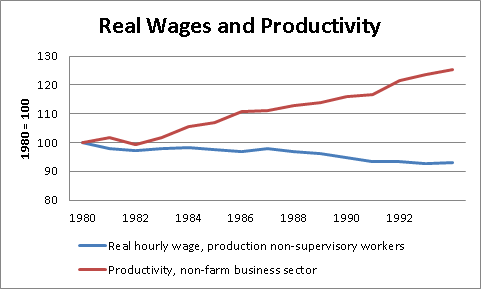January 27, 2013
Okay, that is not exactly what he said, but if Chrystia Freeland’s account of Summers’ comments at Davos is to be believed Summers is badly misinformed about the state of the U.S. economy in 1993, when he was one of the top advisers in the Clinton administration. According to Freeland Summers said:
“In 1993, here’s what the situation was: Capital costs were really high, the trade deficit was really big, and if you looked at a graph of average wages and the productivity of American workers, those two graphs lay on top of each other. So, bringing down the deficit, reducing capital costs, raising investment, spurring productivity growth, was the right and natural central strategy for spurring growth. That was what Bob Rubin advised Bill Clinton, that was the advice Bill Clinton followed, and they were right.”
This is not what the data say. Here’s the story on real wages and productivity.

Source: Bureau of Labor Statistics.
There are some measurement issues that would reduce the gap somewhat, but anyone who could see these two as laying “on top of each other” needs some new glasses. The sharp divergence between productivity and wages began in the 1980s. It would be really scary if Larry Summers, Robert Rubin and the rest did not know this in 1993.
The other parts of Summers’ story are also wrong. The trade deficit was less than 1.0 percent of GDP in 1993. By comparison it was almost 4.0 percent of GDP when Clinton left office in 2000. The interest rate on ten-year Treasury bonds was 6.6 percent in January of 1993. Coupled with an inflation rate of around 3.0-3.5 percent, this gave a real interest rate in the neighborhood of 3.1-3.6 percent. This is perhaps a bit higher than desirable, but actually not much different than what we saw through most of the Clinton years.
In short, Summers is describing a history that does not exist. He either has a very poor memory or is just making things up.







Comments